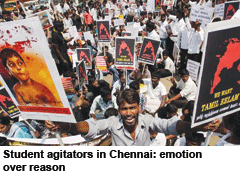Enfeebled by poorly designed syllabuses and worse curriculums, and actively discouraged by institutional managements from participating in political activity or even debating larger political issues, the students union movement in India is in a coma, if not dead.
Therefore Tamil Nadu’s largest students’ protest after the anti-Hindi agitation of 1965 over alleged genocide and war crimes against Sri Lankan Tamils during the last leg of the 26-year-old civil war between the Sri Lankan army and the Liberation Tigers of Tamil Eelam (LTTE) which ended in 2009, has taken academia and the intelligentsia in the state (pop. 72 million) by surprise. Tens of thousands of students enroled in the state’s 438 arts and science, 525 engineering, 14 government law colleges and 17 government medical colleges spilled into the streets in mid-March demanding an impartial international probe into human rights violations in Sri Lanka and justice for victims.
Fearing law and order problems on college campuses, on March 16 the Tamil Nadu government issued orders to shut down all colleges indefinitely and directed students to vacate hostels. However students continued to mobilise support through social networking sites, and over the past two weeks protests have intensified with software professionals, film producers and directors associations, traders and advocates also pledging their support to the agitation. Intelligently, ab initio students didn’t allow political parties to usurp their cause.
While mass protests have now died down, the anger and outrage of students against the Sri Lanka government’s ill treatment of Tamils continues to simmer. During their protest, the students demanded that the Union government press the Rajapakse government in Sri Lanka to acknowledge genocide against Tamils in that country, and wanted an independent probe into human rights violations committed in the island republic when the US-sponsored resolution against Sri Lanka came up for voting at the United Nations Human Rights Council (UNHRC), Geneva on March 22. In their opinion the US resolution which asks the Sri Lankan government to conduct its own “independent and credible investigation into allegations of violations of international human rights law and international humanitarian law” and to implement the recommendations of its Lessons Learned and Reconciliation Commission (LLRC), is too weak.
But although Tamil Nadu’s student unions precipitated the protest against human rights violations by government troops in the prolonged Sri Lanka-LTTE Eelam (‘self governance’) civil war, the issue was hijacked by DMK president M. Karunanidhi who advised New Delhi to press for strongly-worded amendments to the US-sponsored resolution. But when his talks with three senior Congress ministers on March 18 failed to evoke the desired response, he withdrew his party’s support in Parliament to the ruling Congress-led UPA government on March 19.
The AIADMK which is in power in Tamil Nadu, also pitched in, demanding India-sponsored amendments to the resolution. However, after India voted in favour of the “mildly worded’’ US resolution in the interests of Indo-Sri Lanka and Indo-US relations, students and political parties feel they need to make common cause in stepping up their agitation against the Rajapakse government in Sri Lanka whom they accuse of “genocide”.
 “We want a special referendum on an independent Tamil Eelam in north-east Sri Lanka, and an assurance that its Tamil population and is not denied democratic freedoms,” says S. Evera, a final year mechanical engineering student of IIT-Madras where students renewed their protest on March 24.
“We want a special referendum on an independent Tamil Eelam in north-east Sri Lanka, and an assurance that its Tamil population and is not denied democratic freedoms,” says S. Evera, a final year mechanical engineering student of IIT-Madras where students renewed their protest on March 24.
The sustained students’ agitation in hitherto apolitical campuses like IIT-Madras and Loyola College has surprised educationists, college administrators and the general public. But it has also raised questions about whether such protests have really helped Sri Lankan Tamils who are beginning to settle down after the end of the bloody civil war in the island republic. “The students’ protests clearly reveal that emotions have overtaken their ability to reason. Students are not very knowledgeable about politics in Sri Lanka and need to be educated before they make unreasonable demands,” says Alphonse Raj, vice principal, Loyola College, Chennai.
Even as the debate on the emotionally charged student agitation for an international probe into the civil war in Sri Lanka continues, the greatest impact of what is widely acknowledged as futile protest is likely to be on Tamil Nadu’s students’ community. The uncertainty over the reopening date of colleges after they were closed indefinitely on March 16 continues, in the absence of a re-opening notification from the department of higher education. Faculty of private engineering colleges are worried about covering their prescribed portions while practical tests, theory exams and internal assessments in all colleges have been majorly delayed.
With the newly installed Xi Ping government in China reportedly keen on promoting its ‘string of pearls’ strategy to surround India by establishing naval bases in the Maldives and Colombo, and fishing in troubled waters in Nepal, Pakistan and Myanmar, there’s little room for New Delhi to exert any pressure on the firmly-entrenched Rajapakse government in Sri Lanka.
Tamil Nadu’s agitating students would do well to let reason and better sense prevail and resume their classes.
Hemalatha Raghupathi (Chennai)


























